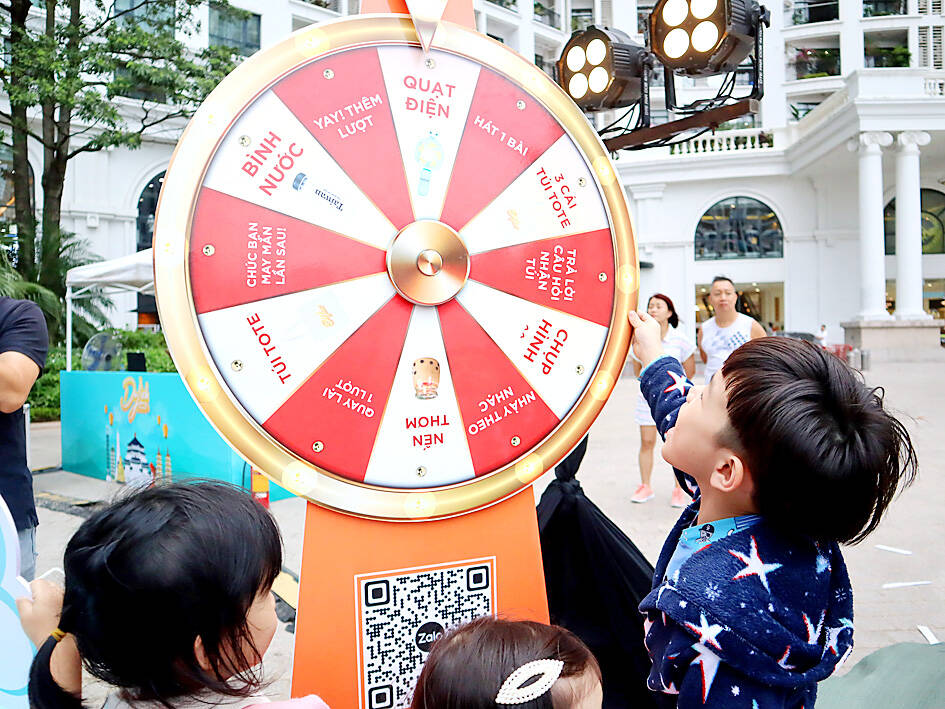The Tourism Administration on Saturday said it has stepped up its marketing campaigns in Vietnam amid increased travel between the Southeast Asian nation and Taiwan, while tour operators to Vietnam are chartering direct flights to attract Taiwanese travelers.
In 2018, the number of tourists traveling between the two countries exceeded 1 million, while more than 400,000 Vietnamese tourists visited Taiwan in 2019, administration data showed.
About 190,000 Vietnamese tourists visited Taiwan during the first six months of this year, which is about 95 percent of the level during the same period prior to the COVID-19 pandemic, the data showed.

Photo: CNA
Most Vietnamese tourists travel to Taiwan as part of tour groups because of the Guanghong Project, a program in place since 2015 to simplify visa application procedures for group travelers from Southeast Asia, said Chou Hsin-yi (周欣毅), director of the Tourism Administration’s Ho Chi Minh City office.
To attract more individual tourists from Vietnam, the administration is working with Klook Vietnam, a leisure and e-commerce platform, to design more than 100 tour packages in Taiwan, Chou said.
They jointly hosted a promotional event in Hanoi on Saturday.
“Compared with those joining group tours, individual tourists tend to spend more days traveling and have a stronger purchasing power,” Chou said. “We hope to encourage more individuals to visit by offering them discounts for signing up for tours.”
Hoang Phuong, a 23-year-old Vietnamese office worker, said he has not yet visited Taiwan because he was not familiar with the visa application procedures.
Aside from stinky tofu and candied fruit on a stick, Huoang said that he would like to try other Taiwanese snacks and desserts when he visits, adding that he would like to spend enough time in the nation to visit tourist attractions in northern, central and southern Taiwan.
Le Thi Do said that she, as an elderly person, is not particularly interested in food.
“I want to know more about history, culture and the way of life in Taiwan, and visit temples,” she said.
Vietnam has emerged as the fourth-largest outbound destination for Taiwanese tourists, as airlines have increased flights to the Southeast Asian nation. In addition to Hanoi and Ho Chi Minh City, Starlux Airlines, China Airlines and EVA Airways have also launched flights to Da Nang, while VietJet Air has launched flights to Phu Quoc island.
The Vietnam-based Crystal Bay Group has chartered flights by Bamboo Airways to Nha Trang, a coastal resort city in southern Vietnam, from Taiwan Taoyuan International Airport and Kaohsiung International Airport.
“Consumers’ expectations for overseas tours have changed in the post-COVID-19-pandemic era. Many are paying more attention to hygiene, safety, health, nature and culture in a country, and prefer to have more flexible tour arrangements,” Crystal Bay chairman Nguyen Duc Chi said.

An essay competition jointly organized by a local writing society and a publisher affiliated with the Chinese Communist Party (CCP) might have contravened the Act Governing Relations Between the People of the Taiwan Area and the Mainland Area (臺灣地區與大陸地區人民關係條例), the Mainland Affairs Council (MAC) said on Thursday. “In this case, the partner organization is clearly an agency under the CCP’s Fujian Provincial Committee,” MAC Deputy Minister and spokesperson Liang Wen-chieh (梁文傑) said at a news briefing in Taipei. “It also involves bringing Taiwanese students to China with all-expenses-paid arrangements to attend award ceremonies and camps,” Liang said. Those two “characteristics” are typically sufficient

A magnitude 5.9 earthquake that struck about 33km off the coast of Hualien City was the "main shock" in a series of quakes in the area, with aftershocks expected over the next three days, the Central Weather Administration (CWA) said yesterday. Prior to the magnitude 5.9 quake shaking most of Taiwan at 6:53pm yesterday, six other earthquakes stronger than a magnitude of 4, starting with a magnitude 5.5 quake at 6:09pm, occurred in the area. CWA Seismological Center Director Wu Chien-fu (吳健富) confirmed that the quakes were all part of the same series and that the magnitude 5.5 temblor was

The brilliant blue waters, thick foliage and bucolic atmosphere on this seemingly idyllic archipelago deep in the Pacific Ocean belie the key role it now plays in a titanic geopolitical struggle. Palau is again on the front line as China, and the US and its allies prepare their forces in an intensifying contest for control over the Asia-Pacific region. The democratic nation of just 17,000 people hosts US-controlled airstrips and soon-to-be-completed radar installations that the US military describes as “critical” to monitoring vast swathes of water and airspace. It is also a key piece of the second island chain, a string of

The Central Weather Administration has issued a heat alert for southeastern Taiwan, warning of temperatures as high as 36°C today, while alerting some coastal areas of strong winds later in the day. Kaohsiung’s Neimen District (內門) and Pingtung County’s Neipu Township (內埔) are under an orange heat alert, which warns of temperatures as high as 36°C for three consecutive days, the CWA said, citing southwest winds. The heat would also extend to Tainan’s Nansi (楠西) and Yujing (玉井) districts, as well as Pingtung’s Gaoshu (高樹), Yanpu (鹽埔) and Majia (瑪家) townships, it said, forecasting highs of up to 36°C in those areas